Franz Theodor Schubert, the school teacher
Richard Law, UTC 2020-07-08 14:24
Those who write about Franz Peter Schubert, in addition to the diversity of their nuanced guesswork and contrary opinions, can be divided into two not particularly original camps: the half-empty and the half-full glasses. Such is the level of our ignorance that both camps can coexist and continue to put bread on their tables after their own manner.
The glass-half-empty crowd is generally identical to the 'Poor Schubert' gang, who see Schubert's life as one continual battle against adversity, poverty and privation.
In contrast, the glass-half-full crowd notes his many struggles with money and health, but prefer to see that, on the whole, he didn't do too badly, all things considered. His earnings in a position as a Director of Music, say, would have been not much different from his earnings as a composing buccaneer, but his composing activity would have been dramatically circumscribed. He deserves our great respect for the courage, self-belief and integrity he showed in swimming so sturdily against the current of his times.
The same absence of certainty allows the same two camps to feud over Schubert's father in exactly the same way. The glass-half-empty crowd likes to portray Franz Theodor as a heartless, uncultured martinet, a gradgrind with no appreciation of Franz Peter's true worth, a hindrance to his professional development.
They ignore his qualities of intellect and character, qualities that bore him through the first year of a Jesuit Gymnasium at the age of six. As a comparison, his brother Karl, who entered at the same time as he did, was fourteen, which was the average age of the first-year class. Franz Theodor accomplished a similar feat when he arrived in Vienna as a fifteen-year-old and began his year at the university, sitting among the twenty-somethings.
The members of the glass-half-full crowd also point to his role as a person of respect in his community and his role in turning the school around from the desolate condition it was in upon his arrrival. They point to the parental confidence in him which resulted in a solid level of enrolments in his school, the basis of the family's income.
He also held several public offices on the side which, although hardly lucrative, were badges of status and marks of popular confidence in him. He and his family may have lived in a cramped hovel above the school in Himmelpfortgrund 72 for fifteen years, but at that time most people, certainly in Himmelpfortgrund and Lichtental, were living in cramped hovels.
And finally, thanks to his father, our composer experienced a better academic education than any of his siblings seem to have received and a solid musical training covering a broad spectrum of the music of the time.
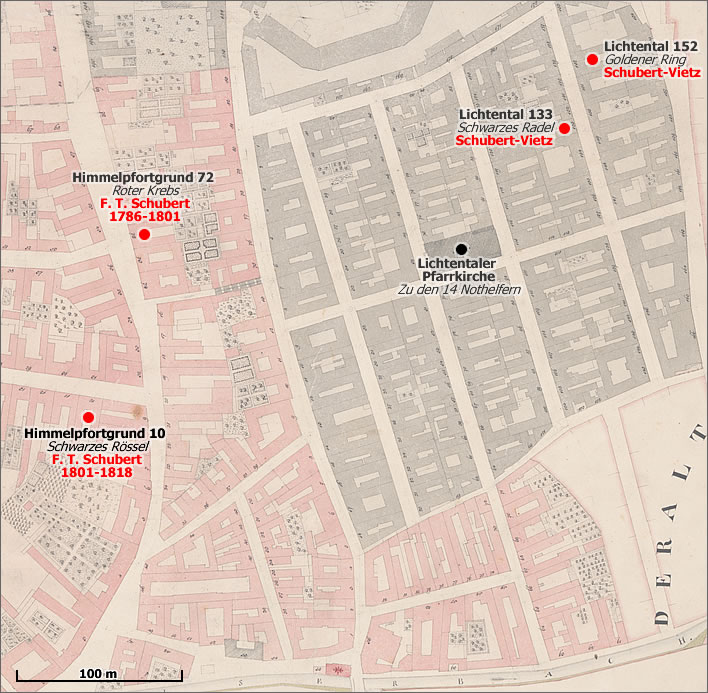
Residences of the Schubert family 1785~1820. Image: Stadtplan, Anton Behsel (1820-1825), Thury, Lichtenthal 1821. ©ViennaGIS/FoS.
But if things were so wonderful for Franz Theodor and his family, the glass-half-empty crowd respond, why did he apply twice in 1797 for positions at other schools?
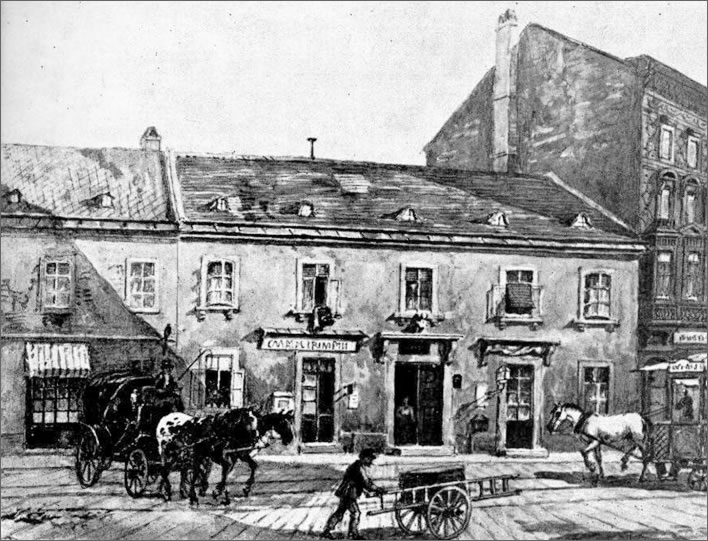
Himmelpfortgrund 72. Aquarelle by Franz Kopallik. Date unknown.
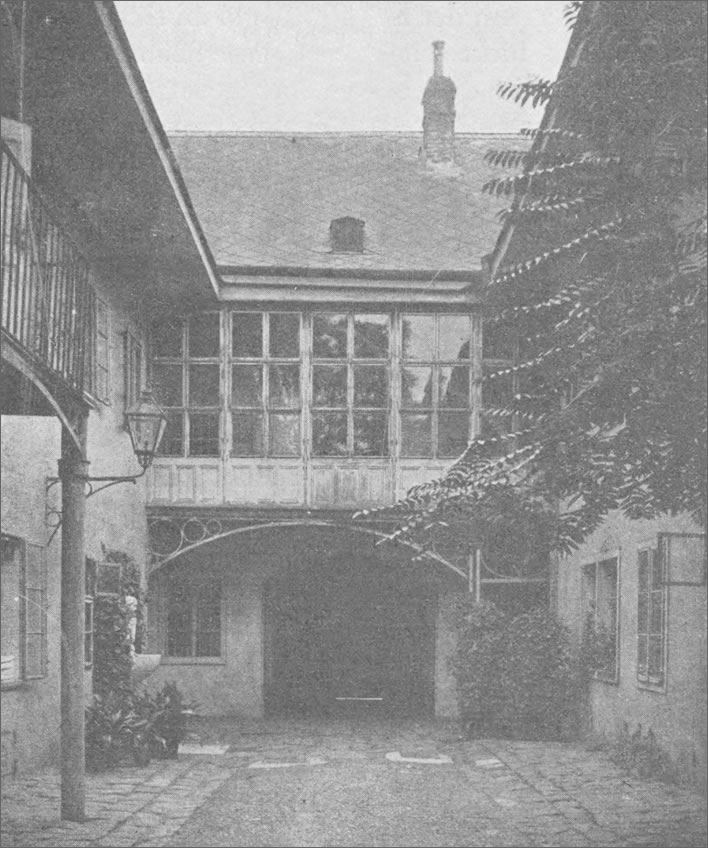
A photograph of the courtyard of Himmelpfortgrund 72. Date unknown.
Franz Peter had been born at the beginning of that year, so that there were now four growing brothers living in those cramped circumstances. In the previous eight years children had arrived but left shortly thereafter, leaving the size of the family more or less unchanged: during those years the couple had effectively one son and a dying infant.
But after Ferdinand's birth in 1794, the family acquired in short order another two sons, Karl and Franz Peter. We have no evidence – but it seems reasonable to assume – that at some point the accommodation became too cramped even for the Schuberts' high bar of tolerance.
Another possible cause of the frequent applications for transfer to other schools may have been financial. According to the Viennese scholar Michael Lorenz, Schubert was suffering from the the general poverty of the inhabitants of Himmelpfortgrund and Lichtental, which were at that time among the poorer suburbs. A glance at the town plan is sufficient to tell us where in Vienna the huddled masses lived – two of those areas were Himmelpfortgrund and Lichtental.
Maria Theresia's insistence in her Schulordnung of 1774 that all children had to be sent to school and parents had to pay school fees was fine in theory, but, like so many top-down despotic measures, difficult to put into practice. What effective sanction could there be against penury? Fines?
The turmoil of the Napoleonic wars, which went on until 1815, bankrupted the Empire and made a bitter joke of monetary policy. At least in a richer neighbourhood he might have been able to make a living.
Even if he had been able to drive up the numbers of his paying pupils in Himmelpfortgrund, where was he going to teach them? He had one not very large room available and the Schulordnung was strict on the point of the number of classrooms a school needed to offer.
Perhaps, covering all our bases, the reason was a bit of everything.
At last, in October 1801, the accommodation problem resolved itself. Franz Theodor and his family moved themselves and their school to Himmelpfortgrund 10, 'Zum schwarzen Rössel', in the Säulengasse.
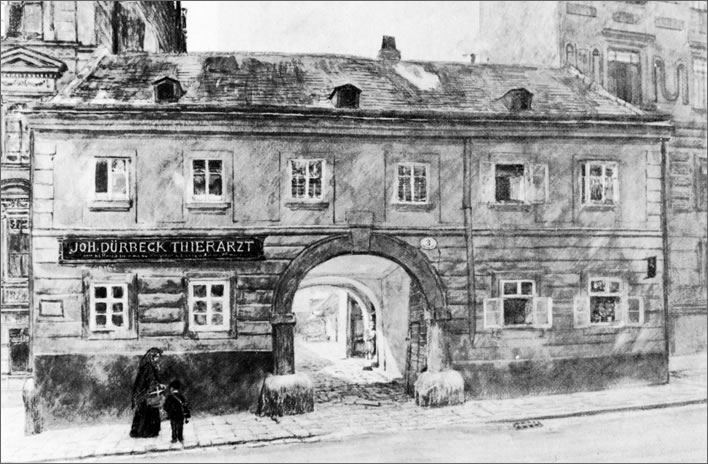
A drawing of Himmelpfortgrund 10. Date unknown.
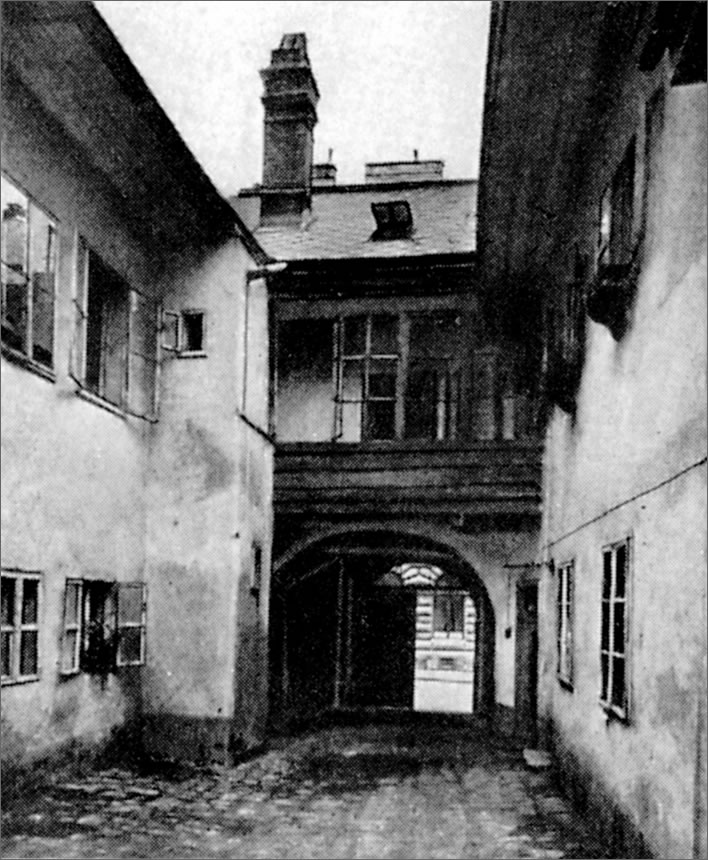
A photograph of the courtyard of Himmelpfortgrund 10. Date unknown.
Then at the end of 1817 the new school in Rossau 147 was built and the Schubert family moved away from the district in February of the following year. The Schuberts' financial position was secure enough for them to keep Himmelpfortgrund 10 and rent it out.
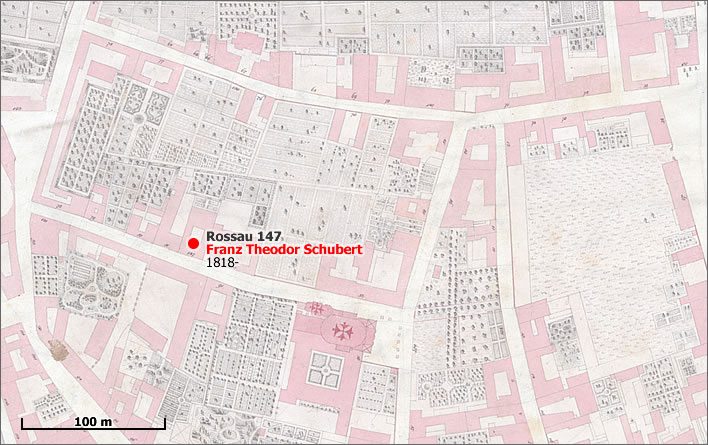
Franz Theodor Schubert's school in Rossau (1818-). Image: Stadtplan, Anton Behsel (1820-1825), Rossau 1821. ©ViennaGIS/FoS.
The Rossau school was the summit of Franz Theodor Schubert's teaching career. He remained there until he died in 1830. He was given the citizenship of the City of Vienna and was being touted for a special award at the time of his death, the Rossau school having come top of the league table of schools in Vienna.
Some luck and much good judgement, but above all dogged perseverance, a capacity for drudgery and the ability to cope with deprivation and privation had brought him as far as such things could. He may have acquired these traits from his pious parents: his own father had become a person of respect in his own community, the Ortsrichter, the 'village magistrate and mediator'. But they would also have been strengthened by the rigours of a Jesuit education from a young age.
The school business
If we are to understand the life of these two teaching families during this period we need to know something about the business of school teaching at that time.
To a modern person, the word 'schoolteacher' barely conveys what the job involved in Schubert's time, when we stand at the moment of the first steps taken by the Austrian authorities to create a professional corps of teachers in order to respond to the challenges of urbanisation and the industrial revolution.
We benefit from hindsight, because that is probably not what they thought they were doing. For those at the time with eyes to see, the Seven Years' War had shown that military success came not just from battles won, but from industrial and economic endurance. In other words, they thought they were getting the Empire fighting fit for the next war when it came – probably against the old enemy, Prussia, now ahead of Austria as a model of a well-run state. The French would learn the same lesson the hard way in their humiliation at the hands of the Prussians in 1870: the winner in any conflict is the nation with the largest and best organized industrial base.
The authorities in the Empire of Paperwork applied their most bureaucratic minds to this educational challenge and produced a system of regulation and control that we would recognise as being not far distant from the sclerotic, rule-based, micromanaged educational systems of our own time. We just have much more of it for much longer.
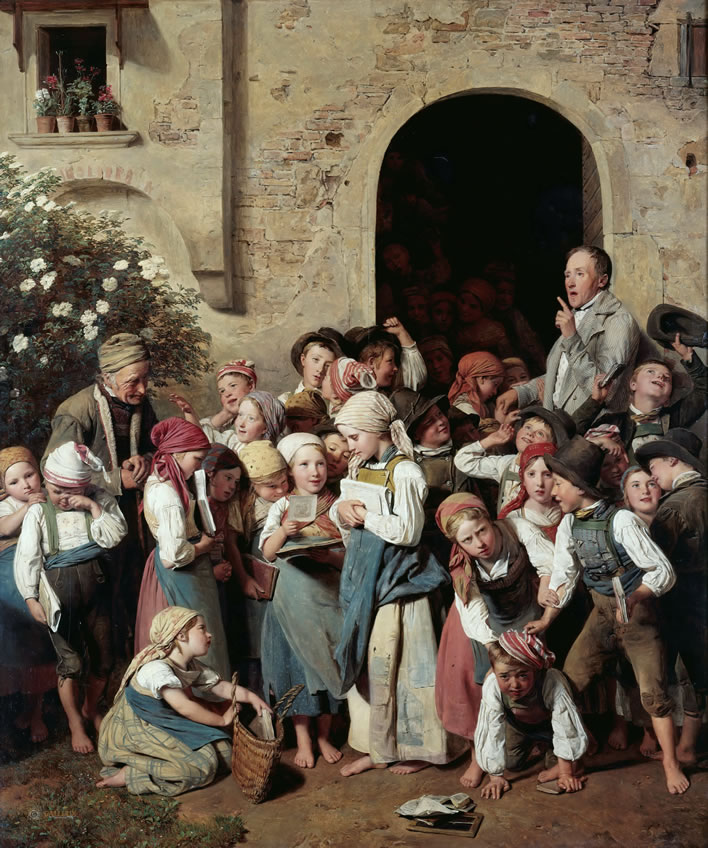
Ferdinand Georg Waldmüller (1793-1865), Nach der Schule (After School), 1841. Image: ©Nationalgalerie der Staatlichen Museen zu Berlin
Painted ten years after Franz Theodor died, the impression is probably not far wrong.
Franz Theodor's first school, Himmelpfortgrund 72, was in a building containing in all 19 units. Each of these consisted of one room, a kitchen and some storage space mainly in the attic. There was a communal garden. The school was housed in the largest unit on the ground floor. For their accommodation the Schuberts had the largest of the units on the first floor. Schubert paid 26 fl. a year for the school unit and 24 fl. for their living quarters.
As we have already noted, for the government of the time school education was an urgent theme. Teachers therefore received a special subsidy of 30 fl. a year towards their accommodation costs. The running costs of the school were also covered by the local authority.
Schubert's school was a Trivialschule, the term used at the time for what we today would call an elementary school. 'Trivial' here is not meant in the way English or German speakers now understand it ('unimportant') but in the sense of 'basic'. Originally derived from the medieval educational categories of the trivium and quadrivium, the term underwent a long process of shifts in meaning, so that by Schubert's time it had come to mean a syllabus of the three 'R's: reading, writing and 'rithmetic – oh, and of course, that other vital 'R', a substantial dollop of religion and catchism learning.
Even with the Jesuits gone, religious orders and organizations controlled elementary education. The local priest played an important role in the school (a fact that irritated Ignaz Schubert particularly). In the list in the School Directive of 1774 of the three things that the Trivialschulen should do, the first item on the list was 'religion, its stories and its moral teachings'. The alphabet, reading, writing and arithmetic came a marked second. This was the pious Maria Theresia's reform, of course.
The School Directive of 1774 had introduced three categories of school. Hauptschulen, 'high schools', were established in large towns, cities and monasteries. Normalschulen, 'standard schools' were established, one in each province, to provide a model of what a school should be and which could be used as a centre for teacher training and qualification. They were the mechanism which would drive up standards in all the other schools (that is why we have avoided the misleading translation 'normal school' – normal is meant here in the sense of 'norm', i.e. setting a standard).
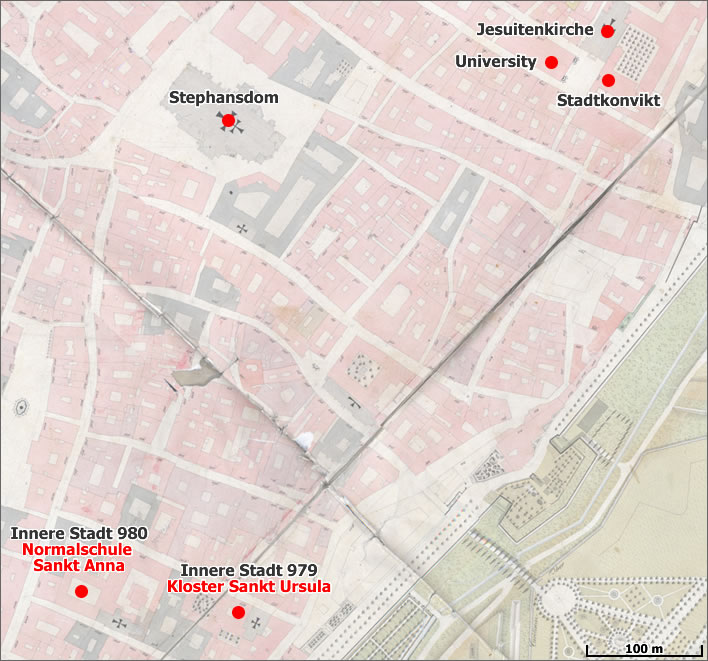
The Normalschule for Vienna, Saint Anna, which started the teaching careers of all the Schuberts, next to it was the Convent of Saint Ursula, which was responsible for the assessment of teachers for girls' classes. The Akademie der bildenden Künste, visited by many of Schubert's artist friends and the location of an annual exhibition, was also housed in this building. Image: Stadtplan, Anton Behsel (1820-1825), Innere Stadt 1824. ©ViennaGIS/FoS.
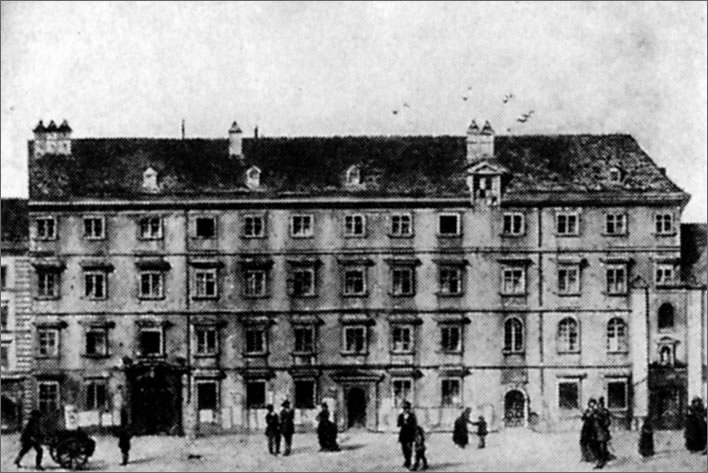
The Normalschule zu Sankt Anna. Date unknown.
Lastly, the Trivialschulen, 'basic schools', were to be set up in every town and community, wherever there was a religious parish. They were, in fact, the 'normal' schools.
As we have said, the Schuberts were in the right place at the right time to ride the educational wave resulting from Maria Theresia's Schulordnung, but we should also note that this was a wave of reform, improvement of standards and professionalisation, not an educational boom. The directive explicitly ruled that new schools were only to be established in places where there was not already a school.
In most smaller schools the older children received three hours of instruction in the morning; the younger children received two hours in the afternoon. There was some flexibility allowed and this may not have been exactly the timetable followed in Schubert's school. Schools in agricultural areas were expected to free the children for farm work during the summer months and would compensate with more lessons in winter.
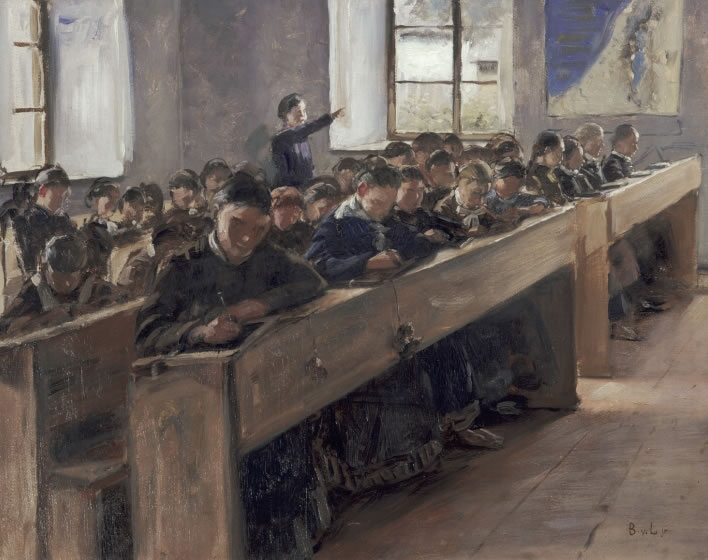
Karl Bennewitz von Loefen der Jüngere (1856-1931), Schule, pre-1909. A scene from a century after Franz Theodor Schubert and his school, in Prussia, not Austria, but not much will have changed. The girls still sit in their own area. Image: ©Nationalgalerie der Staatlichen Museen zu Berlin
Considering that the Austrian Empire was such a model of feudal, rule-based, top-down, mercantilist (mis-)management, the educational system after Maria Theresia's great school reform strikes us in a few respects as surprisingly free-market. There was a general obligation to send children to school, but which school the children went to was a matter of parental choice. The well-heeled preferred to have their children educated by governors, especially in rural areas, thus incidentally creating welcome employment opportunities for penniless poets and writers.
In busy, populous locations such as Lichtental and Himmelpfortgrund, suburbs with high proportions of artisans and skilled and semi-skilled workers, but also with owners of small businesses, parents who could afford it seem to have taken education to be a good and consequently aimed to get the best education for their little ones. Children were sent to schools with a reputation for reliability and success – Franz Theodor's school was definitely one of these.
In the best free-market traditions, therefore, the main income for a school came from the Schulgeld, the 'school fee', that parents had to pay. Unlike in a suburb such as Himmelpfortgrund and Lichtental, where there were plenty of children and there was plenty of demand, schools in sparsely populated rural areas would have their income topped up by the local authority to the legal minimum income for teachers of 130 fl. a year.
This also gives us a measure against which we can judge Franz Peter Schubert's income, since 130 fl a year really was a subsistence income, at times of inflation a near starvation wage. In addition to being underpaid, the village teacher was usually loaded down with additional duties such as ringing the church bells and playing the organ at services. In the contemporary caricatures of teachers, whether in Austria or Germany, they are almost always stick thin and poorly dressed.
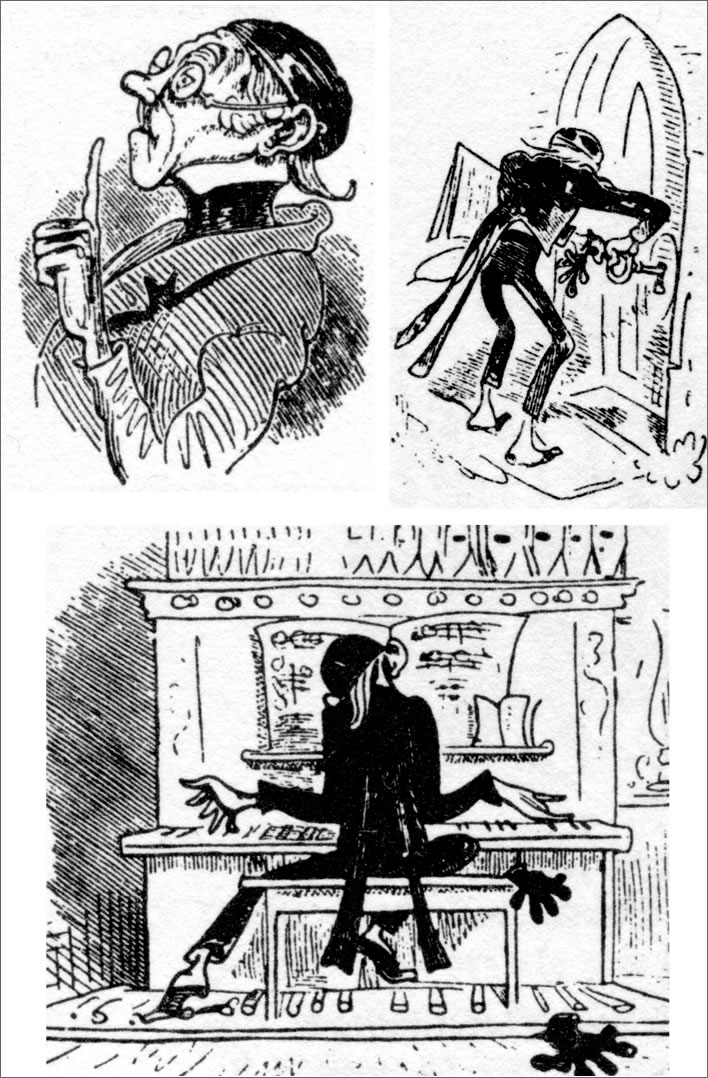
'Lehrer Lempel', the teacher in Max und Moritz: Vierter Streich (1865) by Wilhelm Busch (1832-1908). Every reader of Busch would have immediately recognised the universality of the caricature of 'Lempel the Teacher'. We wrote about the disaster which occurred when the fat and jolly Christian Friedrich Daniel Schubart (1739-1791) tried his hand at schoolteaching but found it definitely not to his taste.
What a wage needed to be in order to be called 'starvation' is a lengthy subject that we cannot pursue now, particularly since during the period in question money changed its denominations and values several times.
The school fee was locally determined according to various complex regulations, but there was nothing to stop some parents paying more than required if they thought their child would get special treatment from a grateful teacher. There were also special regulations covering the children of poor families who could not afford to pay the normal fee. We are, after all, dealing with life in the Empire of Paperwork.
Within this system a prudent and calculating brain such as that of Franz Theodor could make money. Not the sort of money that would make him rich, but one that could give him, a man with restrained, Jesuit tastes, a relatively comfortable existence. His belly might rumble now and again, but he would not starve – unless, of course, he produced children, in which case he was on the road to ruin: Franz Theodor's desperate applications for jobs began when he found himself with four hungry boys under his roof; his son Ferdinand was even less financially circumspect, producing by two wives 28 babies in all, some of whom he had to give away and about a dozen of whom survived childhood. Do we need to say that despite a solid career in education he died broke, leaving nothing for his family?
Franz Theodor's farmer father Carl Schubert died in December 1787 and left him a modest but useful 96 fl, with which he was able to equip his first school and pay off some debts. With the help of careful financial planning, within 15 years of moving into his first school he was able to buy his next one.
Industrious teachers also had numerous opportunities to earn money on the side, whether by giving extra lessons, preparing pupils for entrance examinations and/or giving music lessons – in Franz Theodor's case on the cello.
That teaching could be a business that earned money is demonstrated by the government's ongoing battles to suppress the Winkelschulen, 'corner schools' – we might call these 'pop-up schools' today. They were unregistered schools run by one or more unregistered and unqualified teachers which set up shop in private rooms – a free-enterprise step too far for the Empire of Paperwork.
The religious authorities were particularly worried by the thought of schools which might be teaching the three Rs at the expense of religious education, or religious ideas that were not mainstream Catholic. For the authorities, the best weapon against the pop-up schools were the official schools, well-run by locally respected teachers such as Franz Theodor Schubert.
From farmer's sons to professionals
We see now how those long years which he and his brother Karl had spent at the Jesuit gymnasium in Brünn and that final year at the University of Vienna now paid them back in increased status and improved earnings potential, putting them in the top flight of elementary school teachers.
Not only that, as state employees they qualified for a pension – admittedly only after decades of unimaginable drudgery that only few would survive. They were also freed from conscription into the army. Military service would have been no fun at all in the age of the Napoleonic wars.
The same thoughtful, strategic process would be used later to get Franz Peter a free high school education and musical instruction, rounded off with a teaching diploma.
Brotherly support, in both directions
Despite all Franz Theodor's industrious prudence even the glass-half-full group of Schubertians are surprised to learn that in 1801 he was able to buy his next school outright. From farmer's boy to property-owning city dweller in one generation.
It is sometimes maintained that he did this using a mortgage, the security for which appears to have come from his brother Karl. By that time Karl had laboured for 23 years as the Director of Becker's former school in Leopoldstadt – and laboured prudently and profitably – another Jesuit personality, it seems. Some part of Becker's estate my have devolved upon Karl, either directly or via his childless widow when she herself died.
But in fact, Karl died a poor man, whose burial costs had to be initially covered by his brother. In theory he died quite well-off, leaving the substantial sum of 5331 fl. (C.M.). In practice, though, he was broke: a short while before his death he had lent out 4,050 fl. at a high interest rate, but by the time of his death the loans were irrecoverable and thus worthless.
Furthermore, the medical costs arising from his long battle with tuberculosis would also not have been cheap. This was the background to Franz Theodor's generous offer to accommodate in Himmelpfortgrund 10 Karl's widow Magdalena and her seven-year-old daughter Maria Magdalena ('Lenchen') as well as the Vietz brother Felix and his family (who had presumably been living with Karl's family in Leopoldstadt until then).
Having lent almost all his money out as loans to other people, Karl would have been in no position to guarantee anything for his brother: he simply had insufficient personal liquidity.
Leaving aside his lack of investment talent, one further indicator of brother Karl Schubert's financial success with his school in Leopoldstadt is that after his death, four years after Franz Theodor had indebted himself to buy the school in Himmelpfortgrund 10, Franz Theodor applied for Karl's old job.
Teetering on the first rung of the property ladder
In buying the house, Franz Theodor did not appear to be much of a risk for a lender. Himmelpfortgrund 10 had more space than its predecessor and could accommodate more paying pupils, he had rental income from apartments within the building and education was always going to be needed in Vienna, the imperial capital.
Unfortunately, Franz Theodor's finances did not go as planned.
He acquired the property for 3,200 fl., of which 200 fl. had to be paid immediately in cash. The payment of the remaining 3,000 fl. was covered by a relatively simple agreement dated 14 May 1801 to repay the owner, one Elisabeth Mölzer (-Lebersorger) (1753-1827). After a three year grace period, the 3,000 fl. were to be paid in three instalments of 1,000 fl. over the next three years plus five percent interest.
That Franz Theodor thought he could come up with a thousand fl. a year in disposable income over those three payment years strikes us as a dreamer's optimism; that Frau Mölzer entered into such an agreement with the Schuberts is a sign of great confidence or great stupidity.
As it turned out, both his optimism and her confidence were seriously misplaced: instead of paying off the house in three years it took Franz Theodor fifteen years. He finally cleared the debt on 11 October 1816 with one payment of 3,000 fl.
Let's not weep too many tears for him: the financial crises that engulfed Austria during the Napoleonic wars led to impressive levels of inflation, from which the poor suffered as usual, but from which debtors such as Franz Theodor could see the value of their debts reduced in real terms whilst the government messed around renaming pieces of paper. He was lucky – as he had been so often in the past.
Our tears should be reserved for Elisabeth Mölzer, who was left sitting on the currency losses. By the time of Elisabeth Schubert's death in 1812, for example, the amount of the recalculated debt had reduced to around 2,600 fl. The situation by 1816 was probably worse.
It is uncertain how long Elisabeth Mölzer continued to live in Himmelpfortgrund 10. She had inherited the house in 1793 and she moved out sometime before 1817 to Rossau 129.
All the indications are that she lived her old age out in relative poverty. She would have been much better off if she had charged the Schuberts a rent on the premises. Nevertheless, she was remarkably tolerant with the Schuberts over the fifteen year delay in payment and the losses she had suffered, fifteen years of financial turmoil during which no money came in to her at all.
The Schuberts were, in fact, doubly lucky in their choice of creditor, for at any time in those years she could have very easily driven Franz Theodor and Elisabeth (as co-signer) into bankruptcy, which would have immediately and inevitably ended his career as a schoolmaster, someone required by the church authorities to display 'exemplary character'.
The strange case of Elisabeth Schubert-Vietz
When Elisabeth Schubert died in 1812, by some financial legerdemain half of the current value of Himmelpfortgrund 10 became an asset in her will, even though it was actually a debt for which she had co-signed. After all deductions she left 204 fl. to each of her five children. Of course, this money would only become a real asset when the house was finally paid off and sold.
In reality she died in poverty as she had lived in impoverishment: her will lists no cash, no bonds, no jewellery and only 32 fl. worth of clothes and underwear. In respect of which, for the attention of the modern owners of walk-in wardrobes, we list some items: three blouses, three pairs of stockings, four scarves, three handkerchiefs, two white bonnets, one apron, three dresses, two corsets, two pairs of shoes.
Not very different from the bits and pieces of male clothing her youngest son would leave behind sixteen years later. Death knows no dignity.
The fact that this pauper was accepted as co-signatory on the house loan in 1801 is just one of those mysteries we have to live with.
So, in 1801, with the move to the new school, Franz Theodor and Elisabeth Schubert become property owners, landlords and debtors. One further step up in status.
Ignaz Schubert
But we must try to imagine the financial strain that Franz Theodor and Elisabeth were under during the sixteen years before the debt was finally paid off. Ruin was hanging over them for most of this time. From the little we know of them it seems clear that neither of them was a light-hearted profligate capable of repressing financial reality.
In particular we recall Franz Theodor's plan to get his son Franz Peter a free education. It was hatched with a proficiency test in 1804, took five years of lessons and preparation until he was accepted in 1809. He left in 1813.
We can understand Franz Theodor's frantic desire that his musical son should should join the family firm as well as the worry caused by the desperate applications of Ignaz and Ferdinand for teaching jobs elsewhere. They were all sources of income for the family firm that he could not afford to lose.
Teacher Ferdinand, painter Karl and composer Franz Peter all peeled off to make their own way in the world. Poor old Ignaz Schubert, the elderly outlier among the brothers, was left yoked to his father's school to trudge along the furrow as the years rolled past. He was a dull ox who dragged his yoke with bovine acceptance, despite his detestation of the priestly class who were in charge of the education system and thus of his career.
Some burn damp faggots, others may consume
The entire combustible world in one small room
As though dried straw …
From W.B. Yeats, 'In Memory of Major Robert Gregory' in The Wild Swans at Coole, XI, 1919.
Between 1807, just before his gifted little brother Franz Peter entered the Stadtkonvikt, and 1829, the year after Franz Peter's flare had extinguished, leaving only a blackened hearth, Ignaz Schubert applied for fourteen teaching posts – a simple change of furrow – and was rejected for all of them.
In 1830 his father died and, seemingly faute de mieux, he was finally given charge of the Rossau school, aged 45. The promotion from assistant teacher to schoolteacher now allowed him to marry, which he did in 1836, when, after a long wait, a widow of his own age (Wilhelmina Hollpein-Grob) finally became available.
Money, at last
Franz Theodor and Elisabeth lived prudently and spent modestly, but the sudden appearance of 3,000 fl. in 1816 to pay off the debased debt on Himmelpfortgrund 10 is a mystery for us. Franz Theodor's second marriage, to the daughter of a well-off industrialist, secured the family's financial position even further.
By the time of his death in 1830 his financial situation had improved so much that Franz Theodor was able to leave his widow and children substantial sums in shares and bonds. He was scrupulously even-handed between them but unfortunately, Franz Peter was no longer around to benefit from these riches nor to take comfort from the fact that his legacy was incontestably and immeasurably more valuable than that of his dogged father.
0 Comments UTC Loaded:
Input rules for comments: No HTML, no images. Comments can be nested to a depth of eight. Surround a long quotation with curly braces: {blockquote}. Well-formed URLs will be rendered as links automatically. Do not click on links unless you are confident that they are safe. You have been warned!